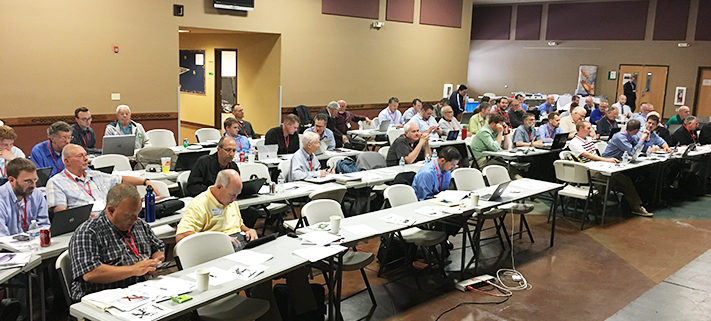Called worker compensation changes discussed
In 2015, the Compensation Review Committee of the Synodical Council began a comprehensive examination of the synod’s compensation guidelines at the request of the 2015 synod in convention. The goal was to simplify the guidelines if possible, to address the question of whether the guidelines can or should do more to provide increased compensation for increased responsibilities, and to analyze whether the current way that years of experience are compensated is functioning as it should.
Earle Treptow, chairman of the Compensation Review Committee, says, “The committee, after about four months of work, came to the realization that many of the concerns about the present compensation guidelines were actually addressed in the current guidelines adopted in 2003. The problem has been that calling bodies haven’t consistently applied the guidelines’ recommendations. The Compensation Review Committee decided to focus on a repackaging of the guidelines, with some revisions, rather than a radical reworking of them.”
The committee presented preliminary thoughts in the 2016 Report to the Twelve Districts and sought comments and input from district convention delegates. District convention delegates had a wide range of opinions.
One area that Treptow says the districts unanimously supported was the production of a user-friendly, web-based tool to assist calling bodies in determining appropriate compensation. The committee is now working with WELS Technology to prepare an online form to help calling bodies with this important work.
A proposal that most districts rejected was the suggestion of reducing the salary matrix from 32 years to 22 years. The committee’s intention in offering that proposal was to have compensation based more on duties and responsibilities than simply on the number of years someone has been serving in the public ministry. Treptow notes that the Compensation Review Committee was not suggesting that workers with more than 22 years of service ought to have their salaries frozen for the remainder of their service, but that was a concern of district convention delegates.
“Our intention was to encourage calling bodies to be more mindful in their approach to compensation,” says Treptow, “spending a little more time reflecting on what they are asking of their called workers—instead of merely pulling a number from a matrix—and that the result would be a greater appreciation for the time and effort those workers are expending with compensation reflecting that. The districts that rejected the proposal thought it would fly in the face of our goal to have compensation that shows double honor to public ministers of the gospel. From their perspective, the proposal was a bit naïve or at least idealistic.”
Treptow notes that this suggestion was removed from the committee’s considerations at its July meeting when the committee began to consider the districts’ feedback.
The Compensation Review Committee will bring its final conclusions and any recommendations to the Synodical Council as it develops the ministry financial plan for the next biennium. Any changes in the compensation guidelines would need the approval of the 2017 synod convention.
SUBMIT YOUR STORY
Do you have a manuscript, idea, or story from your own life you’d like to share for use in Forward in Christ or on wels.net? Use our online form to share it to our editorial office for consideration.
SUBSCRIBE TO FORWARD IN CHRIST
Get inspirational stories, spiritual help, and synod news from Forward in Christ every month. Print and digital subscriptions are available from Northwestern Publishing House.
Author:
Volume 103, Number 9
Issue: September 2016
Copyrighted by WELS Forward in Christ © 2021
Forward in Christ grants permission for any original article (not a reprint) to be printed for use in a WELS church, school, or organization, provided that it is distributed free and indicate Forward in Christ as the source. Images may not be reproduced except in the context of its article. Contact us




